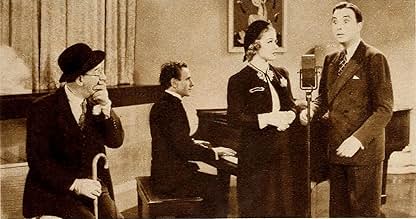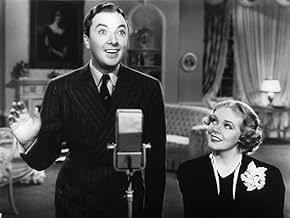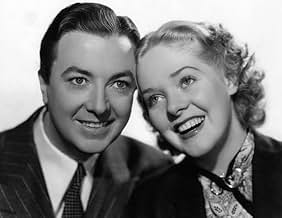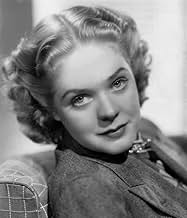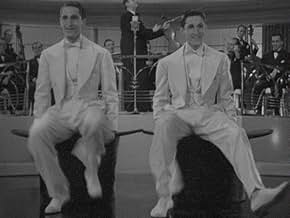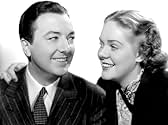Füge eine Handlung in deiner Sprache hinzuSatire on radio, built around the supposed feud between bandleader Ben Bernie and journalist Walter Winchell.Satire on radio, built around the supposed feud between bandleader Ben Bernie and journalist Walter Winchell.Satire on radio, built around the supposed feud between bandleader Ben Bernie and journalist Walter Winchell.
- Auszeichnungen
- 2 wins total
Ben Bernie
- Ben Bernie
- (as Ben Bernie and His Orchestra)
Steve Condos
- Specialty Dancer
- (as Condos Brothers)
Nick Condos
- Specialty Dancer
- (as Condos Brothers)
Empfohlene Bewertungen
7tavm
Three decades after first seeing a poster of this movie in the encyclopedic book about movie comedians-"The Funsters"-in the bio of Patsy Kelly, and a few years ago after I found out this particular film was on YouTube, I finally got to watch Wake Up and Live. The main reason I just watched this was because since this is Black History Month and one of the players in this picture was Eddie Anderson, who by the time this was released had just been cast on radio in "The Jack Benny Program" as Rochester, well, since I usually go chronological in reviewing African-Americans in film during this month, this was next on my 1937 list. Anyway, Anderson appears in two scenes, both on an elevator since he works at one. In his second scene, Eddie tells leading man Jack Haley about an important radio star who wants to see him, first mentioning Fred Allen before segueing to "Jack Bernie" and then to Ben Bernie who's the one looking for Jack. The story itself concerns Haley's mic fright (illustrated by a cartoonish effect of that gadget becoming a demon in front of his eyes) and his attempts to overcome it while practicing in front of a "phony" one for Alice Faye. I'll just now say there are plenty of good songs, a couple of good tap routines by some brothers, some witty lines, a funny dance from Joan Davis, and good supporting turns by Ms. Kelly, Ned Sparks, William Demarest, Walter Catlett, fine numbers by bandleader Ben Bernie, and a good performance by newspaper columnist Walter Winchell as he and Bernie play up their off-screen "feud"! So on that note, I recommend Wake Up and Live.
Walter Winchell started in vaudeville as a performer in Gus Edwards's 'School Days' act. (A fictionalised version of this remarkable troupe became Bing Crosby's movie 'The Star Maker'.) Between engagements, Winchell wrote and published a vaudeville newsletter, filled with showbiz gossip. He eventually became a newspaper/radio columnist, utterly ruthless in his power, quick to destroy an enemy's career and (less frequently) to aid a friend. (The Broadway revue 'Hellzapoppin' was trashed by all the critics, yet ran for more than 3 years because Winchell plugged it in his column every single day.) Although many actors and entertainers desperately coveted a mention in Winchell's column, nearly everyone in show business despised him. (Ed Sullivan once threatened to shove Winchell's head into a toilet.) Winchell wisely avoided feuding with his many enemies, aware that such action would only give them free publicity. One of Winchell's few real friends was popular radio bandleader Ben Bernie, and the two concocted a public 'feud' that was a long-running publicity stunt for them both. Several movies - most notably 'Sweet Smell of Success' and 'Blessed Event' - feature fictional journalists who are blatantly based upon Winchell.
'Wake Up and Live', an above-average Fox musical, features Winchell and Bernie playing themselves ... or, rather, fictionalised versions of themselves, designed to make Winchell look good and their phony feud look genuine. In a staged scene, Winchell rattles off his extensive knowledge of obscure nightclub acts while identifying a masked singer after hearing only a few notes. In another scene - equally staged, but funny - a shifty promoter played by Walter Catlett tries to offer Winchell a bribe. Winchell takes the money but immediately drops it into a charity poorbox. Catlett attempts to retrieve the cash, only to attract the interest of a passing policeman. This scene pays tribute to one of Winchell's few genuine redeeming traits: he was active for many charitable causes. (Winchell founded the Damon Runyon Cancer Fund.) It's fascinating to see Winchell onscreen, even though he's clearing playing a sanitised version of himself. To see him here, you'd never guess he bullied his daughter unmercifully and drove his son to suicide.
Although Winchell and Bernie are prominently featured, the frothy plotline centres on Jack Haley as a would-be radio vocalist and Alice Faye as the singer who encourages him. The sexy and vivacious Faye sings the bouncy title tune. There's a very funny scene in which Haley arrives at the radio station, hoping to audition, when he runs afoul of a sour-tempered studio usher. The usher is played by none other than William Demarest, in his usual mode. It's astonishing to realise that, as late as 1937, Demarest was still playing bit parts like this one ... still, he's very welcome here in his brief scene. Demarest assures Haley that his audition will go well, providing he doesn't get mike fright ... a phenomenon which he then describes to Haley. So, of course, as soon as Haley tries to sing he develops mike fright. There's a delightfully surrealistic sequence in which we see the microphone from Haley's viewpoint, as it morphs into a snarling demon!
There are some lively but irrelevant speciality acts, including a couple of dance routines that would never perform on an actual radio show. Lots of familiar faces in the cast list, and Patsy Kelly is less annoying than usual. The title song is the only good one here. One interesting trivia note: the opening credits of this movie feature two guys from the art department named Mark-Lee Kirk and Haldane Douglas, and their names are stacked onscreen so that 'Kirk' is directly above 'Douglas'. I wonder if a certain dimple-chinned actor, just aspiring to a film career at this point, took his screen name from the credits of this movie? I'll rate 'Wake Up and Live' 9 points out of 10.
'Wake Up and Live', an above-average Fox musical, features Winchell and Bernie playing themselves ... or, rather, fictionalised versions of themselves, designed to make Winchell look good and their phony feud look genuine. In a staged scene, Winchell rattles off his extensive knowledge of obscure nightclub acts while identifying a masked singer after hearing only a few notes. In another scene - equally staged, but funny - a shifty promoter played by Walter Catlett tries to offer Winchell a bribe. Winchell takes the money but immediately drops it into a charity poorbox. Catlett attempts to retrieve the cash, only to attract the interest of a passing policeman. This scene pays tribute to one of Winchell's few genuine redeeming traits: he was active for many charitable causes. (Winchell founded the Damon Runyon Cancer Fund.) It's fascinating to see Winchell onscreen, even though he's clearing playing a sanitised version of himself. To see him here, you'd never guess he bullied his daughter unmercifully and drove his son to suicide.
Although Winchell and Bernie are prominently featured, the frothy plotline centres on Jack Haley as a would-be radio vocalist and Alice Faye as the singer who encourages him. The sexy and vivacious Faye sings the bouncy title tune. There's a very funny scene in which Haley arrives at the radio station, hoping to audition, when he runs afoul of a sour-tempered studio usher. The usher is played by none other than William Demarest, in his usual mode. It's astonishing to realise that, as late as 1937, Demarest was still playing bit parts like this one ... still, he's very welcome here in his brief scene. Demarest assures Haley that his audition will go well, providing he doesn't get mike fright ... a phenomenon which he then describes to Haley. So, of course, as soon as Haley tries to sing he develops mike fright. There's a delightfully surrealistic sequence in which we see the microphone from Haley's viewpoint, as it morphs into a snarling demon!
There are some lively but irrelevant speciality acts, including a couple of dance routines that would never perform on an actual radio show. Lots of familiar faces in the cast list, and Patsy Kelly is less annoying than usual. The title song is the only good one here. One interesting trivia note: the opening credits of this movie feature two guys from the art department named Mark-Lee Kirk and Haldane Douglas, and their names are stacked onscreen so that 'Kirk' is directly above 'Douglas'. I wonder if a certain dimple-chinned actor, just aspiring to a film career at this point, took his screen name from the credits of this movie? I'll rate 'Wake Up and Live' 9 points out of 10.
Usually Jack Haley was placed as second leads or comic reliefs in lousy movies, and while Wake Up and Live isn't a classic, he is given the inarguable lead and almost every song to sing. This mistaken identity comedy is set amidst a faux rivalry between bandleader Ben Barnes and reporter Walter Winchell, who play themselves! While they try to insult and one-up each other, Jack Haley tries to make it as a singer, only he panics whenever he sees a microphone. Alice Faye, a singer, tries to help him get over his "mic fright" but turning the microphone without his knowledge. His voice floods into an entire radio station, and everyone loves him! The only trouble is no one knows who the "Phantom Troubadour" is and Jack doesn't know he's famous.
It's a pretty cute setup, and Jack Haley is given the cute and catchy songs "Never in a Million Years" and "It's Swell of You" to show off his voice. Alice is given one song, and Ben and Walter are given plenty of good-natured banter. Among the supporting players, you'll find Patsy Kelly, Ned Sparks, Miles Mander, and a couple of jaw-dropping numbers by the Condos Brothers. If you liked Pigskin Parade, with Jack and Patsy, you'll probably like this one.
It's a pretty cute setup, and Jack Haley is given the cute and catchy songs "Never in a Million Years" and "It's Swell of You" to show off his voice. Alice is given one song, and Ben and Walter are given plenty of good-natured banter. Among the supporting players, you'll find Patsy Kelly, Ned Sparks, Miles Mander, and a couple of jaw-dropping numbers by the Condos Brothers. If you liked Pigskin Parade, with Jack and Patsy, you'll probably like this one.
One of Darryl F. Zanuck's peculiar quirks was that he frowned upon his musical stars making records. Unlike Bing Crosby who recorded nearly all the songs he sang in Paramount films and numbers from other Paramount films with the encouragement of Adolph Zukor, Zanuck felt that if the public bought records they wouldn't pay to see his films. Alice Faye did manage to record about 20 sides during the Thirties and the last batch she did was four songs from Wake Up And Live. Good thing to because Mack Gordon and Harry Revel wrote some of their best material for this film.
The film itself was based on a make believe radio feud between columnist Walter Winchell and band-leader Ben Bernie who play themselves on screen. Make believe feuds among radio personalities was a common enough thing back in the day, it made for interesting programming and bigger Hooper ratings. The Hooper was the radio equivalent of the Nielsen before television became commercial.
Jack Haley and Grace Bradley are a pair of vaudevillians who travel to New York hoping to cash in on the fact that Haley's sister Patsy Kelly is Walter Winchell's assistant. A mention in Winchell's column gets them inundated with offers, but Haley who apparently has no problem performing before a live audience of a hundred or so in a theater, gets paralyzed with fear over speaking and singing into a microphone that will broadcast to millions.
But one night when Alice Faye is singing on Ben Bernie's program, Haley is in an empty studio singing into what he thinks is a dead mike. His voice comes over the air and no one knows who it is. Immediately he's dubbed 'The Phantom Troubadour' and the hunt is on to find him. It's a contest between Winchell, Bernie, and a bottom feeding sleaze-bag agent played by Walter Catlett. Of course Faye finds out first and looks to exploit Haley in her own way.
It's a nonsensical plot, from an era that spawned this kind of nonsense. Doesn't detract a whit from the fact it's an entertaining film with Alice Faye singing at her very best.
But you won't hear the familiar voice of Jack Haley that you know as the Tinman from The Wizard of Oz. Instead Haley's voice in this film is dubbed by one of the great radio crooners of the time, Buddy Clark. Buddy never did too much work before the camera, but on radio he was one of the most popular singers in his era. Sadly he was killed in a plane crash right before the era of television, I'm sure he would have made it big there.
Alice and Buddy get to sing the title song, Never In A Million Years and Swell Of You. Alice does There's A Lull In My Life and Buddy sings Ooh, But I'm Happy.
Long before I finally got to see Wake Up And Live I had a long playing 33 1/3 vinyl album of Alice Faye with the four songs she sings before Zanuck put an end to her recording career. I knew the songs and loved them. So it was a special treat for me to finally see the film and more so to hear Buddy Clark sing as well even if the words came out of Jack Haley's mouth.
I think if you can ever catch Wake Up And Live you will feel as I do about the great singing voice of Buddy Clark.
The film itself was based on a make believe radio feud between columnist Walter Winchell and band-leader Ben Bernie who play themselves on screen. Make believe feuds among radio personalities was a common enough thing back in the day, it made for interesting programming and bigger Hooper ratings. The Hooper was the radio equivalent of the Nielsen before television became commercial.
Jack Haley and Grace Bradley are a pair of vaudevillians who travel to New York hoping to cash in on the fact that Haley's sister Patsy Kelly is Walter Winchell's assistant. A mention in Winchell's column gets them inundated with offers, but Haley who apparently has no problem performing before a live audience of a hundred or so in a theater, gets paralyzed with fear over speaking and singing into a microphone that will broadcast to millions.
But one night when Alice Faye is singing on Ben Bernie's program, Haley is in an empty studio singing into what he thinks is a dead mike. His voice comes over the air and no one knows who it is. Immediately he's dubbed 'The Phantom Troubadour' and the hunt is on to find him. It's a contest between Winchell, Bernie, and a bottom feeding sleaze-bag agent played by Walter Catlett. Of course Faye finds out first and looks to exploit Haley in her own way.
It's a nonsensical plot, from an era that spawned this kind of nonsense. Doesn't detract a whit from the fact it's an entertaining film with Alice Faye singing at her very best.
But you won't hear the familiar voice of Jack Haley that you know as the Tinman from The Wizard of Oz. Instead Haley's voice in this film is dubbed by one of the great radio crooners of the time, Buddy Clark. Buddy never did too much work before the camera, but on radio he was one of the most popular singers in his era. Sadly he was killed in a plane crash right before the era of television, I'm sure he would have made it big there.
Alice and Buddy get to sing the title song, Never In A Million Years and Swell Of You. Alice does There's A Lull In My Life and Buddy sings Ooh, But I'm Happy.
Long before I finally got to see Wake Up And Live I had a long playing 33 1/3 vinyl album of Alice Faye with the four songs she sings before Zanuck put an end to her recording career. I knew the songs and loved them. So it was a special treat for me to finally see the film and more so to hear Buddy Clark sing as well even if the words came out of Jack Haley's mouth.
I think if you can ever catch Wake Up And Live you will feel as I do about the great singing voice of Buddy Clark.
Good, Old-fashioned musical of the kind no longer made in Hollywood - partly because musicals went out of style and partly because of the antiquated subject matter. In this case, you have to be of a certain age to appreciate the storyline. It concerns a made-up feud between two old-time names, Ben Bernie who was a band leader, and newspaper columnist Walter Winchell. The feud was carried on mainly on radio and in newspapers.
Have I lost you yet? If so, you're probably too young to remember any of the stars or the songs. Alice Faye was as famous as she was pretty, but Jack Haley had yet to achieve immortality as the Tinman in 'The Wizard Of Oz". Patsy Kelly had a long career as an abrasive comedienne in many movies and Joan Davis had yet to hit it big in television. And radio was the main medium in those days - no TV or DVDs or internet or any related device.
Us old-timers can appreciate, but you young folks who are movie archaeologists will find plenty to like here, including several good songs which were popular a long time ago, like "Never In A Million Years" and "There's A Lull In My Life", and the dubbed voice of Buddy Clark, a Golden Age singer. If you can find this picture, watch it - as far as I know it hasn't been released in any format yet.
Have I lost you yet? If so, you're probably too young to remember any of the stars or the songs. Alice Faye was as famous as she was pretty, but Jack Haley had yet to achieve immortality as the Tinman in 'The Wizard Of Oz". Patsy Kelly had a long career as an abrasive comedienne in many movies and Joan Davis had yet to hit it big in television. And radio was the main medium in those days - no TV or DVDs or internet or any related device.
Us old-timers can appreciate, but you young folks who are movie archaeologists will find plenty to like here, including several good songs which were popular a long time ago, like "Never In A Million Years" and "There's A Lull In My Life", and the dubbed voice of Buddy Clark, a Golden Age singer. If you can find this picture, watch it - as far as I know it hasn't been released in any format yet.
Wusstest du schon
- WissenswertesJack Haley's singing was dubbed by Buddy Clark.
- VerbindungenFeatured in Tap Dance (1989)
- SoundtracksThere's a Lull in My Life
Music by Harry Revel
Lyrics by Mack Gordon
Performed by Alice Faye (voc) and Ben Bernie and his Orchestra (as Ben Bernie's Orchestra)
Top-Auswahl
Melde dich zum Bewerten an und greife auf die Watchlist für personalisierte Empfehlungen zu.
Details
- Erscheinungsdatum
- Herkunftsland
- Sprache
- Auch bekannt als
- Lev livet levande
- Drehorte
- Produktionsfirma
- Weitere beteiligte Unternehmen bei IMDbPro anzeigen
- Laufzeit1 Stunde 31 Minuten
- Farbe
- Seitenverhältnis
- 1.37 : 1
Zu dieser Seite beitragen
Bearbeitung vorschlagen oder fehlenden Inhalt hinzufügen

Oberste Lücke
By what name was Wake Up and Live (1937) officially released in Canada in English?
Antwort
